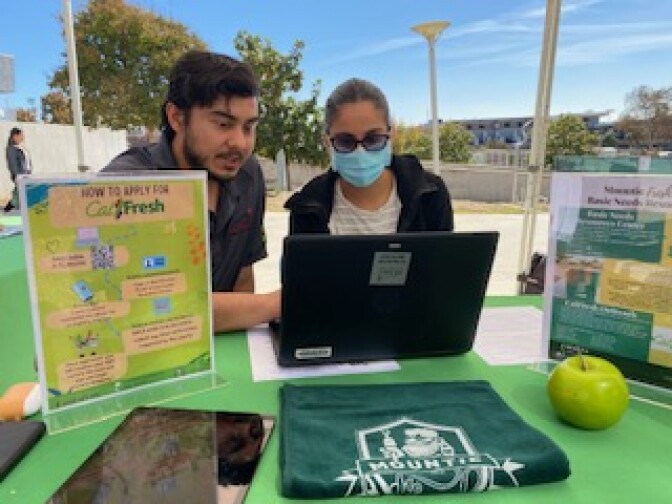This story is free to read because readers choose to support LAist. If you find value in independent local reporting, make a donation to power our newsroom today.
As CalFresh College Eligibility Narrows In June, Students Are Stepping Up To Help Peers Navigate The Enrollment

CalFresh, California’s version of the federal Supplemental Nutrition Assistance Program (SNAP), was second nature for Stephany Rosales when she was growing up.
“I actually have been a CalFresh recipient since I was 18,” said Rosales, who’s now a sociology major at Cal Poly Pomona.
Reaching the university hasn’t been easy. She entered the foster care system when she was about 5 years old. A couple of years ago she transferred from nearby Mt. San Antonio College. But her first semester at Cal Poly Pomona was a struggle. She experienced homelessness, but CalFresh provided a stability with food that she didn’t have with housing.
“The CalFresh benefits have helped me maintain my focus on my academic success, rather than have to continuously worry about what I'm going to eat or my basic necessities,” Rosales said.
CalFresh eligibility expanded during the pandemic to include college students on a few different kinds of approved work study programs. Students whose families could not contribute any funds towards their education, based on financial aid declarations, were also included in the eligibility pool, as long as other requirements were met too. The work study and family contribution eligibilities are going away in June.
Rosales is employed part time at her former campus, Mt. San Antonio College, to do CalFresh outreach support. That means talking to the community college students to find out if they qualify for the help.
The CalFresh benefits have helped me maintain my focus on my academic success, rather than have to continuously worry about what I'm going to eat or my basic necessities.
“We let them know what's currently in place, but that it's going to be changing soon,” Rosales said.
Vivian Hernandez, program coordinator of basic needs resources at Mt. San Antonio College, is among staffers who help students find food and housing resources. They’re worried that narrowing federal eligibility and the weak economy will lead to increased food insecurity.
“We want our students to ensure that when they are in their classes that they retain the information,” Hernandez said.
Federal rules are eliminating some eligibility
More California colleges are opening food pantries where students can pick up fresh and packaged food that’s free. The food pantry at Long Beach City College is called the Viking Vault.
“We're seeing over 1,000 students every week that are coming in for our pantry. Last month in March, we had over 5,000 [visits],” said Justin Mendez, interim director of basic needs at Long Beach City College.

It’s clear, he said, that more and more people don’t have enough money to properly feed themselves.“These changes continue to increase the importance of CalFresh as a resource,” Mendez said.
Rigo Estrada, Mt. San Antonio College’s director of basic needs resources, said his office logged a high of more than 500 student applications for CalFresh in the Spring 2022 semester.
These and other colleges say the student outreach workers will be key during the next academic terms because while one door of CalFresh eligibility is closing, another, created by California legislators, is opening.
A new California law is expanding eligibility. How one campus is carrying it out
Assembly Bill 396, signed into law by Gov. Gavin Newsom last year, opens CalFresh eligibility to California community college and California State University students enrolled in credit and non-credit programs that have an employment or training component.
Campuses had to submit lists of academic programs to the state. Classes could include animation, kinesiology, and automobile repair.
“We're looking into, how do we start letting students know that because they're part of the educational programs, they still meet the eligibility requirements,” Estrada said.
Estrada’s campus submitted a long list of classes to the state. About 200 were approved.
Until about a decade ago, policymakers did not consider food and housing aid as an essential element of an individual’s higher education costs. Student activists, non-profit organizations, and college administrators are increasingly saying that helping college students pay for food and housing is in the public interest.

“There's a lot of students who, if they had access to these benefits, may be more likely to stay in school and that's something that we're trying to understand better,” said Jennifer Hogg, a research manager at the California Policy Lab.
Hogg’s team is researching how many California college students enrolled in CalFresh from 2009 to 2021 and the educational impact of having those food funds. Some of the research is out and she expects more to be out within the next year.
Amid all these changes in CalFresh, college staff say students who have benefitted from CalFresh and who do campus outreach work are the best poised to help students get the aid.
“I'm very big on support,” said Cal Poly Pomona student Stephany Rosales.“I want students to know that I'm here to support them and I'll do whatever I can.”








